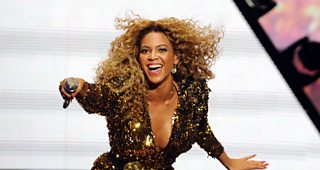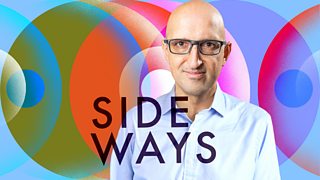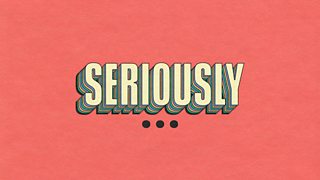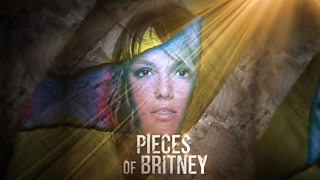Why we all need an alter ego
Some of the most successful people around have used alter egos to get the edge, from Beyoncé to Robbie Williams to Rafael Nadal.
But the benefits of alter egos aren’t limited to the stage or the sports field.
In an episode of Sideways - Let's All Be Batman - Matthew Syed looks at how adopting an alter ego can help us all to access confidence, push ourselves in the face of challenges and, ultimately, become the best versions of ourselves.
-
![]()
Sideways with Matthew Syed
Best-selling author Matthew Syed explores the ideas that shape our lives with stories of seeing the world differently.
What is an alter ego?
The idea that one person can host two identities has fascinated people for millennia. But it wasn’t until the 19th century that the term alter ego was brought into the popular imagination by the psychoanalyst, Sigmund Freud. Freud thought of the self as a collection of distinct states of consciousness, each with its own qualities and traits.

Today, the term alter ego is used to describe a second identity – different to the one we live in our day-to-day lives. But just like our primary identities, each alter ego is unique, with its own origin story, its own personality, and character.
Using an alter ego for escapism
Alter egos can liberate us from our own minds.
The alter-ego Glamrou was created by Amrou Al-Kadhi, a British-Iraqi screenwriter, drag performer and author. With wig, heels, glitter and make-up, Amrou becomes Glamrou. But it’s about so much more than the costume. When Amrou takes the stage as their alter ego, they step into another persona, another world, where they can be whatever they want, and feel confident and powerful. “Glamrou allows me to feel my best self,” says Amrou.
And from the beginning Glamrou offered relief from Amrou’s battles with obsessive compulsive disorder, a condition which they describe as a “cerebral prison.” Performing onstage provides an antidote to OCD: “Drag for me is probably the most present and out of my head experience that I’ve ever known,” says the drag artist.
Using an alter ego to achieve sporting greatness
Adopting an alter ego can be a way of taking performance to the next level.

Todd Herman has spent years working with top athletes – from the Danish Olympic team to the New York Yankees – helping them to step into alter egos to sharpen their game. It’s something he learnt the benefits of first-hand. “I was troubled by the fact that I had all these ambitions for being a great athlete but I wasn’t big,” he recalls. “I was extremely scrawny and, when I went on to the field, I didn’t want to take this skinny Todd guy.” There wasn’t much he could do about his physique, but there was something he could do about the way he felt about it. He decided to play through another persona: “Jeronimo.” A bold name for a bold alter ego. “It allowed me to play way bigger than I actually was,” says Todd.
When he started to work with athletes on mental performance, Todd realised that he wasn’t alone in using this technique: “The best of the best that were consistent would bring up a persona, an alter ego, or a secret identity that they would use to play through,” says the performance coach. For instance, tennis heavyweight Rafael Nadal spends five minutes in front of the mirror stepping into his alter ego before each match. Rafa off the court may be a very, kind, humble human being – but the alter ego on the court with him is “an absolute killer.”
Using an alter ego to release a new type of creative force
The concept of using an alter ego to up your game is not limited to the world of sport. Robbie Williams talks with extraordinary insight about the personality he adopts to wow audiences on stage, to inject additional confidence into his shows, and to release a new kind of creative force. “Robbie Williams is like a construct. It’s like a superhero,” says the pop star. “My name’s Robert Williams, it’s not Robbie Williams. Robbie Williams gets on stage; Robert Williams raises his kids.”
Beyoncé went public about her alter ego, “Sasha Fierce”, on Oprah in 2008. “It’s kind of this character that I created over the years,” she admits. Sasha was fierce by name, fierce by nature, and Beyonce could draw on her in those moments when she needed to be fearless. Her alter ego would show up when she heard the crowd; when the nerves hit. “Sasha Fierce appears in my posture and the way I speak,” says the performer.
“The Batman Effect”
We can all use the alter ego technique in our own lives, particularly when it comes to dealing with stress.

Professor Ethan Kross, from the University of Michigan, has been researching how shifting our perspective can affect how we approach challenges. He and his team put kids under stress, with difficult puzzles and tasks to solve. They then asked some of the youngsters to pretend they were a superhero they admire, like Batman or Dora the Explorer. “What we find in these studies is that children who adopt this alter ego, the persona of a superhero, they tend to perform better on these tasks,” says Ethan. They persist longer and experience less frustration.
The power of self-distancing
Ethan and his team suspect that part of the magic behind what they’ve dubbed “The Batman Effect” has to do with the process they call “self-distancing.” Self-distancing refers to our ability to take a step back and think about our experiences from a more psychologically detached perspective. “It can be quite useful for helping people work through problematic emotional experiences,” says Ethan.
And you don’t need to wear a cape to reap the rewards of this technique. One tool is “distanced self-talk”, which involves coaching yourself through a problem like you would a friend. The language you use is key: when we use words like “you” and “your” rather than “me” and “my” we’re actually activating different parts of our brain – the parts we normally use to think about other people. And we’re often much better at helping other people than we are at thinking through our own problems.
When the alter ego and the self become one
For some people the alter ego may start off as an act, and a way of differentiating the different dimensions of identity, but it can end up integrating multiple parts of ourselves in one identity – with transformative results.

Amrou found that they were having to suppress different parts of themselves in different environments: at home they suppressed their sexuality; in drag they suppressed their Arab identity; outside of drag they suppressed their femininity. “That sort of fracture sent me a little bit crazy,” they admit. Something changed when Glamrou became real. “I started doing drag shows that are really authentic to who I am and some of the things that happened in my life,” says Amrou. Drag became the glue where they could bring everything about themself together in one place: “From feeling like it’s impossible to be queer and Arab at the same time to then presenting as a queer Arab icon on stage; from feeling embarrassed to be feminine to suddenly feeling so galvanised by femininity.” These days they don’t consider Glamrou to be an alter ego: “She is such an honest manifestation of Amrou, it doesn’t make sense for me to conceptualise her as something alternative. Glamrou is me.”
In 2010, Beyoncé “killed” her alter ego. She declared that she no longer needed Sasha Fierce. She had grown into the person Sasha had helped her to become.
Rewriting our own story
Alter egos often start out as role play, but if you stick with it your alter ego may end up showing you what you’re capable of. We build up a story of what we can and cannot do. Stepping into the world of an alter ego can be a way to consciously reconstruct our own identities and rewrite the stories of ourselves.
As a tool to grow in confidence, to engage in self-distancing, to perform more creatively and find new ways of expressing oneself, the evidence makes a strong case for adopting an alter ego. It can be incredibly empowering: helping us to break free from the limitations imposed by our own insecurities, and by society.
An alter ego can help us to live as the truest version of ourself.
More from Radio 4
-
![]()
Sideways: Let's All Be Batman
Matthew Syed looks at how adopting an alter ego can help us to access confidence, push ourselves in the face of challenge and, ultimately, become the best versions of ourselves.
-
![]()
Why It's Ok To Be Unoriginal
Imitation may be brushed off as the sincerest form of flattery, but being accused of plagiarism can be a galling experience. This is why new ideas are so hard to come by, and what we can do to reignite our originality.
-
![]()
Seriously...
�������� to the world’s best audio documentaries and podcast recommendations. Host Vanessa Kisuule brings you two fascinating new episodes every week.
-
![]()
Pieces of Britney
Britney Spears: pop icon. Pandora Sykes pieces together what we know about her story, and what it tells us about sex, entertainment, and how we treat women in the public eye.




